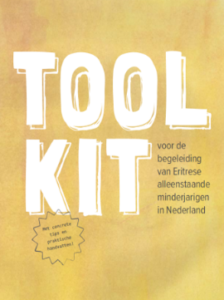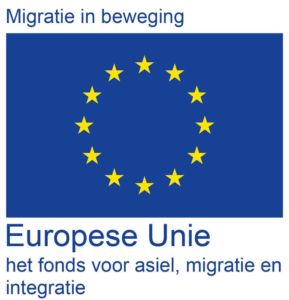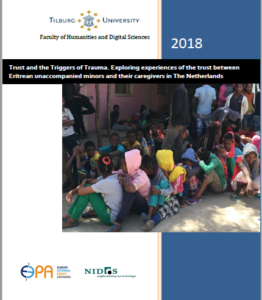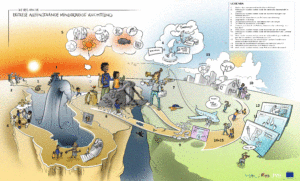Project-partner: ARQ National Psychotrauma Centre/ Centrum’45
November 2016 – April 2018
Objectives: promote the self-reliance of unaccompanied refugee children from Eritrea; to increase knowledge about Eritrean culture and the needs of unaccompanied refugee children from Eritrea among guardians and youth coaches; to develop a culture sensitive and stress and trauma informed intervention.
Project outputs
1) Research on the Resilience of Eritrean UMRs
Research has been conducted to identify factors that influence the development of unaccompanied refugee children from Eritrea. The research considered both factors that stimulate or hinder development and the findings can be found in the report entitled “Alleenstaande minderjarigen uit Eritrea in Nederland: kansen en bedreigingen aan het begin van een nieuw leven”, Arq en Nidos, 2017 (only in Dutch-language).
 2) Toolkit supporting resilience of Eritrean UMRs
2) Toolkit supporting resilience of Eritrean UMRs
Based on the above research, a Toolkit was developed for guardians and youth coaches to support the resilience and self-reliance of unaccompanied refugee children from Eritrea. It provides useful knowledge and insight to refugee children and contains practical recommendations that guardians and coaches can use in their daily work. The Toolkit is entitled: “Toolkit: de begeleiding van Eritrese alleenstaande minderjarigen in Nederland” Arq en Nidos, 2018 (only in Dutch-language).
This research focussed on the concept of trust amongst unaccompanied refugee children from Eritrea and their environment. It explored how trust is conceived and how their environment contributes to feelings of trust or distrust. Research data outlined that trust is conceived as a process and emphasised that refugee children are resilient and strategic. The research paper is entitled “Trust and the Triggers of Trauma. Exploring experiences of the trust between Eritrean unaccompanied minors and their caregivers in The Netherlands”, Tilburg University & EEPA, 2018 (available in English-language).
4) A culture sensitive, stress and trauma informed intervention
Upon arrival in the Netherlands, many refugees from Eritrea exhibit trauma related complaints. In order to be able to help unaccompanied refugee children from Eritrea directly and thus to avert an imminent development stagnation, the project piloted a short-term culture sensitive intervention, based on EMDR (Eye Movement Desensitization and Reprocessing) and NET (Narrative Exposure Therapy). The intervention was tested with a small group of unaccompanied refugee children from Eritrea and the pilot was continued and expanded to unaccompanied refugee children of differing cultural backgrounds in the follow-up project, Resilience II.
5) Knowledge Centre – Eritrean UMRs
The knowledge centre addressed questions from guardians and youth coaches, prepared information materials in the form of background notes based on case studies and frequently asked questions, organised information and exchange meetings, supported external research, and piloted intercultural mediation. The background notes provide practical recommendations for Nidos, partners and for minors on various topics. A total of 15 notes (only in Dutch-language) have been written and shared, supported by an illustration (see above). The illustration follows the journey of UMRs from Eritrea to the Netherlands and from guardianship to self-reliance and acts as an index to the notes. The notes correspond with key junctures along the journey and are numbered on the illustration itself.
Contact details
Winta Ghebreab
Manager Resilience Project
Phone: +31 (0) 6 2300 9239
Email: w.ghebreab@nidos.nl





